Poll of the Week: Are customers being treated like guinea pigs by companies?


The NextPit community made no secret of its distrust for device manufacturers, especially mobile phones ones, in its responses to this week's poll. When asked if they had the impression that companies treat customers like guinea pigs, most responded with a resounding "Yes."
And apparently the sentiment is not a new one, with many readers across all domains in which NextPit is published responding that not only have they bought products based on brand promises, but they also recall a feature being cancelled before it was even released.
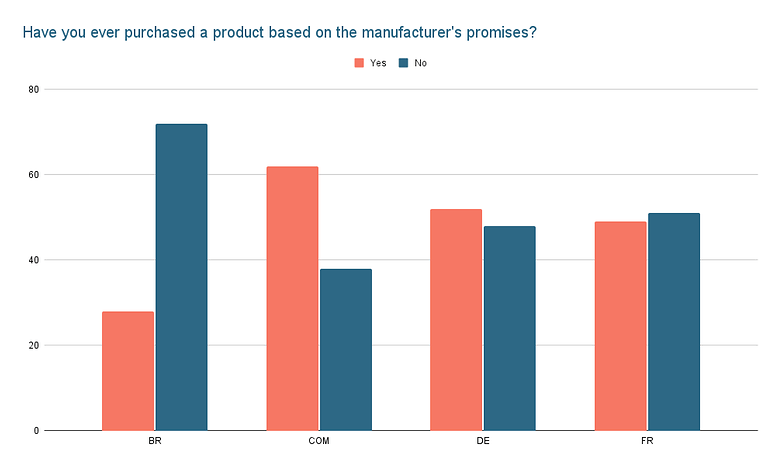
Regarding the first question, the discrepancy between the English and Brazilian site results is perhaps explained by the fact that products are traditionally launched earlier in English-speaking markets, sometimes even before other rich countries. Meanwhile, it is not uncommon for a product to arrive in Brazil months after the foreign market, giving the consumer time to see the product "mature".
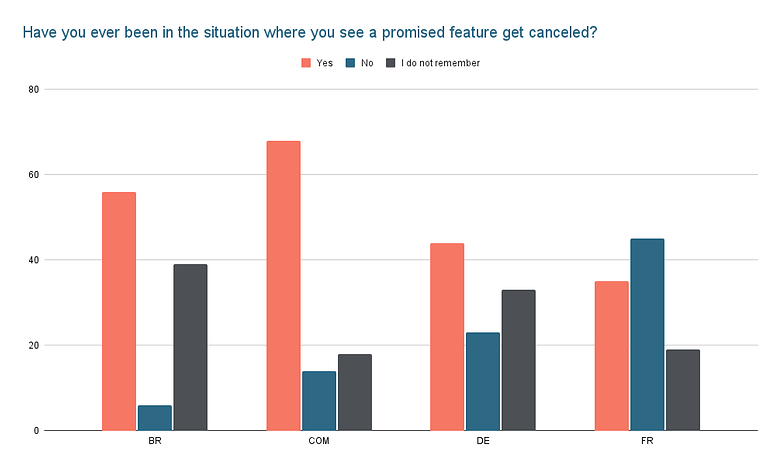
Despite the differences in the previous answer, Brazilians as well as North Americans and Indians mostly answered that they have already had features cancelled before launch. On this point, Germans and French were evenly split overall, with a slight predominance of "Yes" among Germans and "No" among the French.
At this point, the French Pirlo01 recalled the case of a feature that came to be made available, but soon removed in a system update, after the revelation of possible uses for invasion of privacy: The camera "x-ray" OnePlus 8 Pro. At the time, readers of NextPit's French, English, and Portuguese sites responded that they saw no problem with the feature.
Which brings us to the question highlighted in the title of this week's poll. The majority of the NextPit community responded that they have the impression that companies do treat customers like guinea pigs, despite the different distributions of responses in the previous questions. The percentage ranged from 61% on the English site to 81% on the Brazilian site.
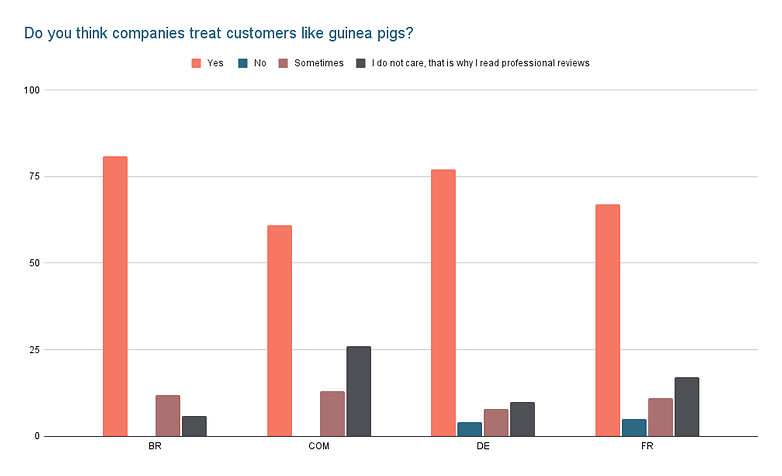
I admit I was surprised by the distance to the second most voted option. Here, German Timo highlighted my personal point well:
We will be treated as guinea pigs in some cases. But then we also need to ask why we allow ourselves to be treated as guinea pigs.
If I need or want a feature and the product does not offer it, I would not buy it just because the manufacturer promised it. In that case, I either pick up an alternative or wait to see if the promise is actually fulfilled.
In a way, it's a curse and a blessing that you can fix everything possible today with an update or ship it later. Imagine, for example, if the latest Cyberpunk 2077 was released in the Playstation 2? era.
Distrust also with system updates
The same negative stance manifested itself in this week's bonus question. Most NextPit readers also do not trust the system update policies announced by manufacturers. Amidst negative update histories and unfulfilled promises, it's not hard to understand the responses...
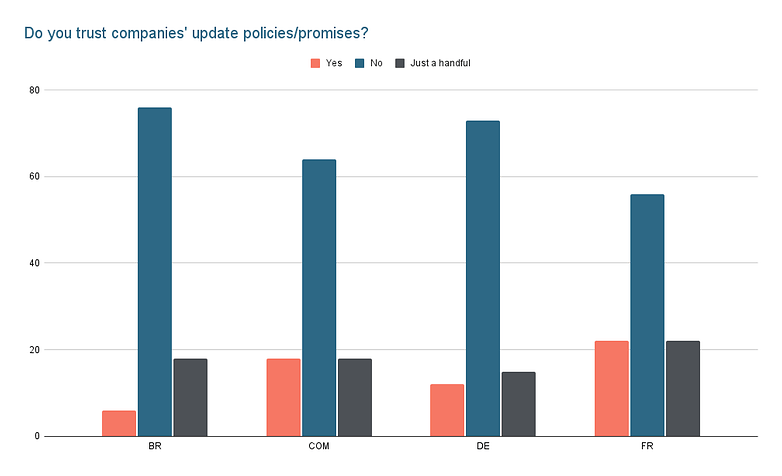
But I'll leave the system updates for an upcoming edition of the poll, published every Friday here on NextPit. See you next time! Oh, and feel free to discuss the different results this week!
Original article
More and more of the products and devices that we use today are very different from the time when we first unboxed them. They would most probably have received feature updates, hardware and software optimizations that often deliver features that were unavailable at launch. On the other side of the coin, some manufacturers bet on promises of features that are currently under development in order to sell products now. Are we, the customers, being treated like guinea pigs? Welcome to this edition of Poll of the Week.
This poll was directly influenced by feedback from the opinion piece published this midweek on NextPit. The article briefly cited cases of products that were announced with features that failed to materialize until months after the product's release, also known as Beta Culture. In select cases, the features are still remain nothing but promises of a pot of gold at the end of the rainbow...
If [company] says so, it's true (or not?)
To kick things off, let's first check out how many of us are able to admit that we bought a product based on future promises and not exactly on what the product actually delivered.
As a follow-up, the second question deals with the bitter experience of seeing a promised feature canceled without any sign of it being released. It's not, for example, about features that were removed later, such as options being disabled via updates, or Gear VR support on the Galaxy S10 phones with the arrival of Android 12, but rather, features that were announced even before launch and never arrived.
All of these lead us to the titular question. Do you get the feeling that companies are treating consumers like guinea pigs by releasing unfinished products or without all the promised features?
Bonus: Do you trust brands' update policies?
This week, HMD Global, the company that represents the Nokia brand, announced that it will not update the Nokia 9 PureView to Android 11, as it had announced over a year ago. This raises the question: Are manufacturers' own update policies are nothing more than empty promises until they are fulfilled? Sounds a lot like politics!
We have asked questions about the matter and discussed several times the importance of providing system and security updates, and often use the update history of the companies to estimate the period of time for updates. We've often relied on companies' update histories to estimate the length of support for new handsets. At this point, it's worth noting that Nokia had one of the best histories of timely updates in 2019 and 2020. But does this recent news serve as a warning for us to become more skeptical of companies?
Do you remember any specific examples of announced features that ended up being canceled right before launch? Editor Zois Bekios Zannikos recalled Stadia, which two years after its launch, still receives relatively basic resources as public groups. Feel free to cite other examples by commenting on this poll. See you on Monday (6 December), when I'll be back to review the community's responses.






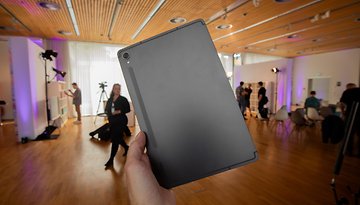

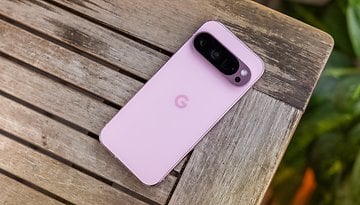
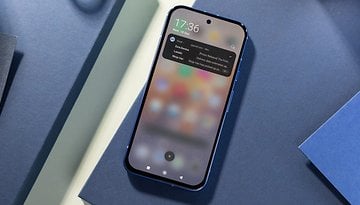




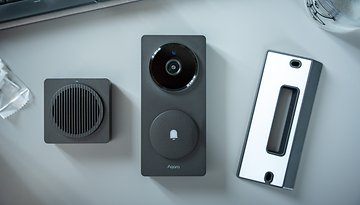





Some Self Reflection: It is not the fact that they deliver a beta product that worries me; Some people -including me- want to try out newer experiences and are willing to put their comfort on the line for the chance to experience a game, new technology, or a product faster.
What worries me is that those companies lie. Making huge promises that are not even close to realization. And, to add insult, it is not smaller vaporware companies that would use these shady marketing tactics to draw attention in a bid to compete in the market. The new trend is for big guys to lie the worst. And this infuriates me because they don't have to.
Tesla is now one of the most overvalued companies exactly for that reason. Not because of competent, tried tech and innovation but unfulfilled promises. Meanwhile, customers are getting screwed with half-finished products, while Musk is abandoning ship by selling his shares.
To make it even more infuriating, people like Musk are taking their money from disenfranchised young adults who have been f*ked by the system and feel like their only retirement plan is Tesla shares or a random dog-inspired coin exploding in price. I guess it hurts less the second time?
We are, as an industry, on the peak of Mount-Stupid or the "Peak of inflated expectations" in the Gartner hype cycle. The ride down from here is something we can't escape with more lies.
And we, tech journalists, are not innocent. We, more often than not, don't just partake in hype building but we wordsmith it to perfection, digging our own graves in the meantime. If tech companies must trade in tech, we must trade in honesty. And I wonder whether we are rotten or just peak stupid.